911 Dispatcher Assessment Test Mastery: Boost Your Score & Advance Your Career
- Overview
- Practice Test
- Curriculum
- Reviews
If you’re looking for an all-in-one dispatcher prep course, you’ve come to the right place!
The role of a 911 dispatcher goes beyond just fielding calls. It’s a high-stakes position where you become the bridge between life-threatening emergencies and help. Beyond the technical aspects, the role demands emotional resilience, precise intuition, and an unyielding commitment.
With our Ultimate 911 Dispatcher Prep package, you get a comprehensive training program tailored to meet these demands. Crafted by seasoned experts in the field, this course is your passport to ace that initial crucial test and embark on a rewarding career.
We provide specialized prep packages for CritiCall, NYPD Communications Technician Exam, and POST. However, if you’re seeking a comprehensive prep for a 911 dispatcher test, we recommend this course as your all-encompassing toolkit.

911 Dispatcher Exam Prep Course
Last Updated: Jan 23, 2025
Course Content
-
 Introduction to 911 Dispatcher Exam 1 StepBuy this Course: Get full access to all lessons, practice tests and guides.
Introduction to 911 Dispatcher Exam 1 StepBuy this Course: Get full access to all lessons, practice tests and guides. -
 Reading Comprehension 4 StepsBuy this Course: Get full access to all lessons, practice tests and guides.
Reading Comprehension 4 StepsBuy this Course: Get full access to all lessons, practice tests and guides. -
 Vocabulary & Spellings 4 StepsBuy this Course: Get full access to all lessons, practice tests and guides.
Vocabulary & Spellings 4 StepsBuy this Course: Get full access to all lessons, practice tests and guides. -
 Oral Instructions Proficiency 7 StepsBuy this Course: Get full access to all lessons, practice tests and guides.
Oral Instructions Proficiency 7 StepsBuy this Course: Get full access to all lessons, practice tests and guides. -
 Map Reading Skills 4 StepsBuy this Course: Get full access to all lessons, practice tests and guides.
Map Reading Skills 4 StepsBuy this Course: Get full access to all lessons, practice tests and guides. -
 Clerical Skills 23 StepsBuy this Course: Get full access to all lessons, practice tests and guides.
Clerical Skills 23 StepsBuy this Course: Get full access to all lessons, practice tests and guides.- Introduction to Clerical Skills
- Plain Copy Typing
- Listening and Typing
- Numbers Typing
- Alphanumeric Typing
- Address-Checking
- Name and Number Comparison
- Strategies to Ace Clerical Skills
- Listening & Typing Practice Questions – Easy
- Listening & Typing Practice Questions – Moderate
- Listening & Typing Practice Questions – Hard
- Number Typing Practice Questions – Easy
- Number Typing Practice Questions – Moderate
- Number Typing Practice Questions – Hard
- Alphanumeric Typing Practice Questions – Easy
- Alphanumeric Typing Practice Questions – Moderate
- Alphanumeric Typing Practice Questions – Hard
- Address Checking Practice Questions – Easy
- Address Checking Practice Questions – Moderate
- Address Checking Practice Questions – Hard
- Name & Number Comparison Practice Questions – Easy
- Name & Number Comparison Practice Questions – Moderate
- Name & Number Comparison Practice Questions – Hard
-
 Decision Making & Multitasking 4 StepsBuy this Course: Get full access to all lessons, practice tests and guides.
Decision Making & Multitasking 4 StepsBuy this Course: Get full access to all lessons, practice tests and guides. -
 Personality Assessment 5 StepsBuy this Course: Get full access to all lessons, practice tests and guides.
Personality Assessment 5 StepsBuy this Course: Get full access to all lessons, practice tests and guides. -
 Bonus - Interview Prep 1 StepBuy this Course: Get full access to all lessons, practice tests and guides.
Bonus - Interview Prep 1 StepBuy this Course: Get full access to all lessons, practice tests and guides. -
 Bonus - Background Screening 1 StepBuy this Course: Get full access to all lessons, practice tests and guides.
Bonus - Background Screening 1 StepBuy this Course: Get full access to all lessons, practice tests and guides. -
 Bonus - Psychological Examination 1 StepBuy this Course: Get full access to all lessons, practice tests and guides.
Bonus - Psychological Examination 1 StepBuy this Course: Get full access to all lessons, practice tests and guides. -
 Bonus - Polygraph Test 1 StepBuy this Course: Get full access to all lessons, practice tests and guides.
Bonus - Polygraph Test 1 StepBuy this Course: Get full access to all lessons, practice tests and guides. -
 Bonus - Medical Exam 1 StepBuy this Course: Get full access to all lessons, practice tests and guides.
Bonus - Medical Exam 1 StepBuy this Course: Get full access to all lessons, practice tests and guides.
What is the 911 Dispatcher Test?
The 911 dispatcher test evaluates individuals aspiring for a role in emergency dispatch. It focuses on testing key skills like multitasking, memory retention, map interpretation, and high-pressure decision-making. More than just a test, it’s a measure of one’s ability to be a reliable link during emergencies, gauging both emotional resilience and clear communication skills. Passing this exam is a testament to a candidate’s readiness for the role of an emergency dispatcher, ensuring they’re equipped to handle critical moments when lives hang in the balance.
Types of 911 Dispatcher Tests
Different public-safety agencies in the US and Canada each have their own standards when it comes to hiring dispatchers. This means that the content and focus of 911 dispatcher tests can vary. Here are some of the most common tests:
CritiCall 911 Dispatcher Test
Regarded as a gold standard in the dispatcher industry, CritiCall has been adopted by more than 1,800 agencies to vet potential candidates. It is designed to consider approximately 16 core skills vital for dispatch roles. These skills range from multitasking and data entry to map reading and rapid decision-making amidst high-pressure scenarios. The test uses mock emergency scenarios to see how well a candidate can multitask, and there’s also a separate module for personality assessment. The modules you are tested on might vary based on the agency they are applying to.
Check out our dedicated CritiCall prep course that will prepare you for all 16 modules and the personality test too.
POST CA 911 Dispatcher Test
Held primarily in California, the POST (Peace Officer Standards and Training) Dispatcher Test serves as an entry-point assessment for dispatchers. It evaluates verbal prowess, reasoning capabilities, memory recall, and perceptual aptitude in potential candidates. This test is structured into 11 distinct modules, each accompanied, and takes about 2.5 to 3 hours to complete the whole test. Of the total eleven modules, six use the traditional paper-and-pencil method with multiple-choice questions and the remaining five are auditory, requiring candidates to attentively listen to information and then choose the corresponding answers from the test booklet.
Police Communications Technician Test
The Police Communications Technician Test is designed to evaluate the skills and capabilities essential for the pivotal role of NYPD 911 operator. It tests the candidates’ proficiency in a range of areas including written expression, memorization, problem sensitivity, deductive reasoning, inductive reasoning, and information ordering. The test ensures individuals possess the requisite abilities to adeptly manage critical communications between law enforcement officers and the public.
National Dispatcher Selection Test (NDST Exam)
The National Dispatcher Selection Test (NDST) is a comprehensive assessment utilized to gauge candidates’ competencies in managing emergency calls, decision-making, prioritization, and teamwork. The test is designed to measure diverse aspects of dispatcher performance, including reading comprehension, listening skills, problem-solving ability, prioritization, and multitasking aptitude.
Success Stories
4.6 28 Reviews
rob, 16 Jan
Solid review course that covers the…
Solid review course that covers the relevant topics in good detail
chad, 11 Jan
Great Program, amazing practice simulations
Easy to understand. Passed tests on first time thru.
QUEEN RIGHTEOUS, 07 Jan
Highly recommended.Great instructional…
Highly recommended.Great instructional information. I passed on the first try.
MasterCommand, 14 Nov
Prepterminal. Prepare, practice, execute.
To say that Prepterminal helped me prepare and be ready for the testing phase would be an understatement. At first, looking at the course, I felt overwhelmed with the course material, but the course broke down each subject effectively which made it easier to understand. There were a few issues with some of the audio portion of the testing course, but beyond that, the course was well worth the money.
Abazix LLC, 09 Nov
Would recommend
Study material helped to pass my test on the first try.
Natalia M. Delgado, 08 Nov
Exelent course 100% guaranteed
Exelent course 100% guaranteed
Modules & Sample Questions in 911 Dispatcher Tests
Dispatcher tests typically consist of a range of modules designed to test the important skills required for the role. Here are some common testing modules you might encounter in almost every dispatcher test:
Reading Comprehension
In this part, they’re checking how well you can understand what you read, pick out important details, and get the whole picture. They’ll give you a piece of writing and then ask you questions about what you read, what a dispatcher should do, or what comes next in the story.
Passage
The art of calligraphy, once an essential skill for scholars and monks, has evolved into a form of expression merging writing and drawing. Traditionally, it required mastery over brush and ink to reproduce intricate scripts, representing not just words but the essence of the writer. Contemporary calligraphy has broken the boundaries of traditional scripts, allowing artists to weave their personalities into their creations. With the rise of digital technology, virtual calligraphy tools have become popular, offering endless possibilities for creativity while preserving the core essence of the art.
-
A:
Digital Tools: The Future of Art
-
B:
The History of Writing and Drawing
-
C:
Calligraphy: A Blend of Tradition and Modernity
-
D:
Brushes, Ink, and Scripts: Tools of Monks
Explanation:
The title should encapsulate the essence of the passage. Here, the transition of calligraphy from traditional to modern forms, including the influence of digital tools, is discussed, making (C) the most fitting title.
Vocabulary & Spellings
Besides clear pronunciation, being a dispatcher requires a grasp of vocabulary and spellings, spanning from simple to complex words. This involves understanding meanings, proper spelling, and effectively comprehending diverse verbal calls from callers. In this module, you can expect to encounter synonym questions and tasks that require you to fill in blanks with the correct spellings.
-
A:
Blaze
-
B:
Police
-
C:
Ablaze
-
D:
Rapid
Explanation:
Elimination Technique: Eliminate blaze and police as they do not match the context of responding to a call. Ablaze is a different word altogether.
Clue Utilization: Consider the context of the fire department's quick response. The term rapid aligns well with swift action.
Sentence Testing: Replace the word rapid in the sentence with the word in uppercase, "The fire department SWIFTLY responded to the emergency call, showcasing their dedication to public safety."
-
A:
occurence
-
B:
occurrance
-
C:
occurrence
-
D:
None of these
Explanation:
Rule Applied: "Double 'r' Past Tense: In words ending with '-er' or '-ur,' double the 'r' in the past tense if the accent falls on the last syllable.
Oral Instructions
Given the fast-paced and critical nature of emergency response calls, the dispatcher’s ability to swiftly comprehend and promptly execute verbal directives assumes a position of paramount importance. Within this specific module, individuals are presented with a verbal audio clip, followed by questions that draw from its content, offering a practical assessment of their proficiency in this vital skill.
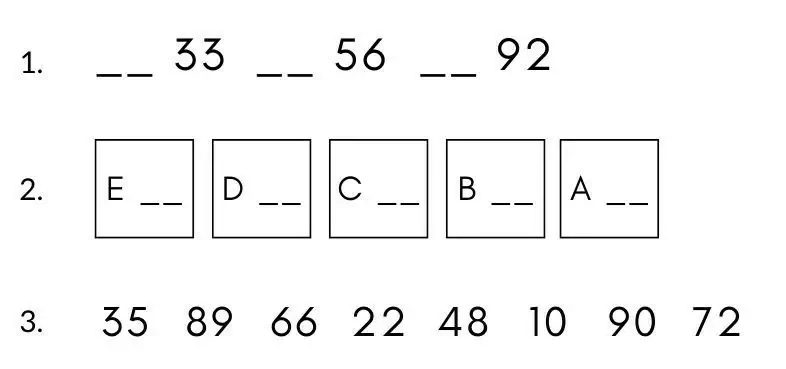
Instruction: Look at line 1 on your worksheet. Next to the left-most number, write the letter “A.” Now, on your answer sheet, find the space for the number beside which you wrote, and darken the space “A.”
Solution:
This instruction is pretty direct. Locate the left-most number which is “33” and write the letter “A” beside it in the space provided. Refer to the following image to know what it would like-

The next part takes you to the answer sheet, which is your OMR sheet, on it locates the number-letter combination you just deciphered. Blacken the space of the letter “A” for the number “33” in your OMR.
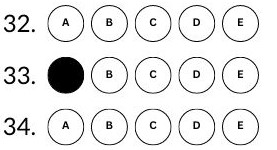
Clerical Skills
To excel as a dispatcher, it’s essential to type quickly and without errors. A benchmark for many is typing 35 words per minute flawlessly. In this module, you’ll be provided with a passage, either written or audio, and you’ll need to type out what you encounter. Remember, if there are mistakes in your typing, regardless of your speed, it might hinder your chances of passing this section.
See the below information and type exactly what you see
| 2503 | $212.12 | 8321 | @212 |
| 51602 | $141.80 | 9834 | 516.14 |
| 203.53 | @983.4 | $123.70 | $203.98 |
This is how the Data Entry box will appear.

Explanation:
This will look like this when filled.

Map Reading
For a dispatcher, understanding and navigating maps effectively is crucial. They must quickly interpret routes, landmarks, and provide accurate directions during emergencies. This module tests a candidate’s ability to read maps and translate that knowledge into actionable information. Dispatchers will be presented with various map scenarios and will be questioned on routes, locations, and potential obstacles to ensure they can guide emergency responders efficiently to their destinations.
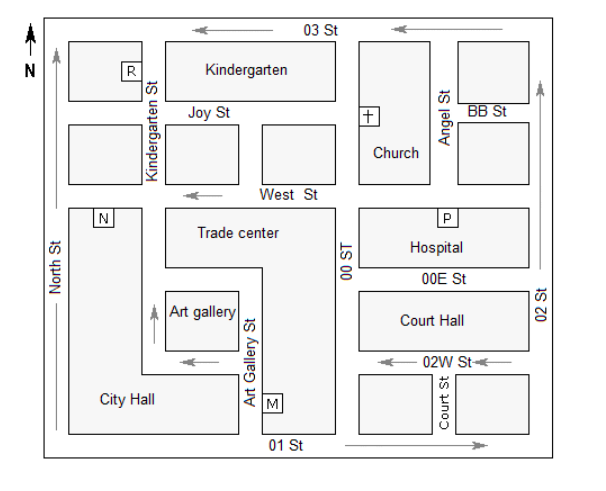
Scenario: A 911 dispatcher receives a call from a bus driver. The driver reports, "took a right turn from the Court Hall and then a left. There is a serious road accident at the intersect 3 people injured badly.
-
A:
West St & 00 St intersect
-
B:
Joy St & Kindergarten St intersect
-
C:
Kindergarten St & West St intersect
-
D:
Kindergarten St & 03 St intersect
Explanation:
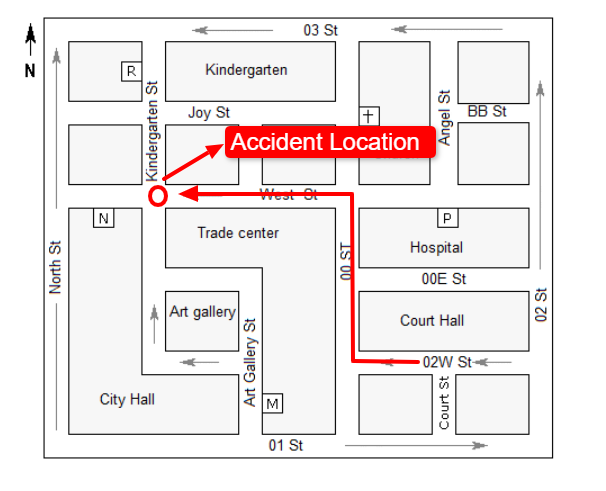
Multitasking Abilities
The multitasking module tests a dispatcher’s capability to handle multiple tasks at once without errors. Candidates will face scenarios simulating concurrent incoming calls and emergencies while answering the other modules of the test. This ensures that they can manage stress and maintain organization during high-pressure situations.
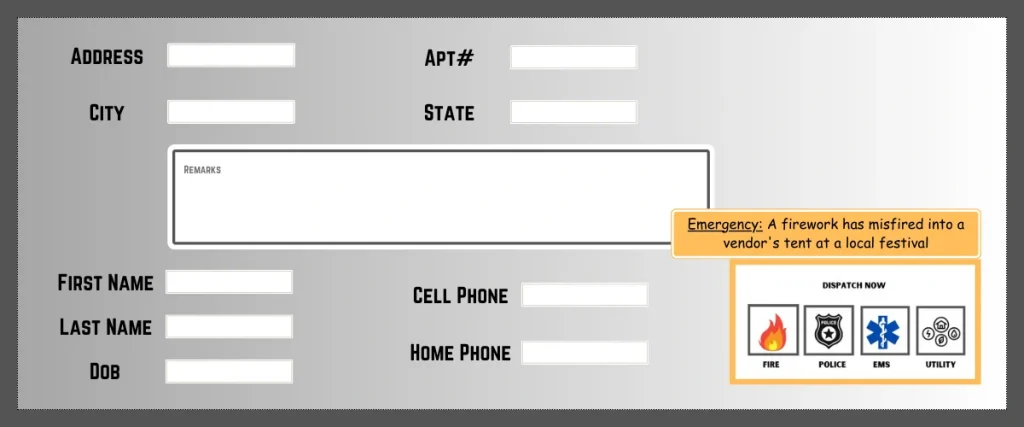
Decision Making
The section evaluates a dispatcher’s skills in logical thinking and decision-making. It focuses on deducing specific conclusions from clear data and deriving general insights from observed patterns. Such reasoning capabilities are essential in choosing the right response in diverse emergency situations.

Try Our Free 911 Dispatcher Practice Tests
Crafted by experts, this practice test aims to simulate the real thing, giving you insights into the types of questions you’ll face. Dive in now and see how prepared you are!
Reading Comprehension Practice Test
Map Reading Practice Test
Clerical Skills Practice Test
Oral Directions Practice Test
Personality Practice Test
Our Dispatcher Prep Package Can Help You Prepare
Pressed for time? Elevate your readiness with our focused Dispatcher Prep Package that includes:
- Written Comprehension: 20 real-life scenario passages encompassing 100 questions.
- Vocabulary & Spellings: Vocabulary & Spellings: 50 diverse word challenges spanning simple to intricate terms
- Oral Instructions: audio clips testing comprehension and responsiveness to verbal directives.
- Clerical Skills: 40 tasks evaluating typing accuracy and speed based on real-life dispatcher scenarios.
- Map Reading: 25 map exercises testing route optimization and geographical awareness.
- Multitasking Abilities: 20 simulations assessing efficient management of simultaneous tasks.
- Decision Making: 35 questions gauging logical conclusions and pattern recognitions from varied situations.
Plus, we’ve got a bunch of handy tips and tricks to help you tackle those tough questions and shortcuts to solve problems faster and boost your scores.
FAQs: 911 Dispatcher
How hard is it to pass the 911 dispatcher test?
The 911 Dispatcher test is tough because it simulates the real challenges of the job. Without dispatch experience, it can be tricky, especially with sections on quick decision-making and handling multiple calls. It’s designed to test how you manage real emergencies.
What is the typing test for a 911 dispatcher?
The typing test for a 911 dispatcher checks how well you can quickly and accurately enter data, a key skill for the job. You’ll need to type at a speed of 35 to 45 WPM, with a test time of 5 to 10 minutes. Accuracy is crucial since corrections don’t count toward your final score. The test includes letters, numbers, and symbols, reflecting the variety of information you’ll handle on the job. Focus on boosting both speed and accuracy to perform well under time pressure.
What is a good score on a dispatcher test?
A good score on a dispatcher test usually depends on the agency’s requirements, but generally, 70% or higher is considered passing. Some agencies may require higher scores in key topics like decision-making, multitasking, and typing. Scoring in the 80-90% range is typically seen as excellent and can boost your chances of moving forward in the hiring process. Aim to perform well in all sections, as some agencies might consider certain sections more based on their needs.
Is there a time limit for the 911 Dispatcher Exam?
Yes, most 911 Dispatcher Exams are timed. The exact time limits depend on the exam and the agency. These tests have different sections that assess skills like data entry, decision-making, and multitasking, with each section usually lasting between 5 and 15 minutes. Overall, the exam can take around 2 to 3 hours to finish.
What happens if I fail the 911 Dispatcher Exam?
If you fail the 911 Dispatcher Exam, the specific consequences and next steps will depend on the agency you applied to. Most agencies have a retake policy, but the details vary. Some agencies may require you to wait a certain period, like six months before you can retake the exam, while others may allow you to retake it sooner if the position is reopened.
Failing the exam typically means you won’t move forward in the hiring process for that particular round, but you can usually reapply and try again after improving your skills. It’s essential to check with the specific agency for their retake policy and any additional steps you might need to take.
Is the 911 Dispatcher Exam the same everywhere?
No, the 911 Dispatcher Exam is not the same everywhere. Different agencies and jurisdictions use various tests to assess candidates, with the CritiCall test being one of the most common. However, some places may use other exams, like the POST Dispatcher Test in California or the NYPD 911 Operator Exam. Each test may have different sections, scoring methods, and specific skills they emphasize based on the needs of the agency.
Are 911 dispatchers required to take a polygraph test?
Yes, many 911 dispatcher candidates are required to take a polygraph test as part of the background check process. This requirement varies depending on the agency and jurisdiction, but it is common in public safety positions, including 911 dispatch roles. The polygraph test is typically used to verify the truthfulness of the information provided by the candidate during the hiring process, including criminal history, drug use, and other factors that may affect suitability for the job.
The polygraph is just one component of a comprehensive background check that can also include psychological evaluations, drug tests, and in-depth interviews. The goal is to ensure that candidates are trustworthy and capable of handling the responsibilities of a 911 dispatcher
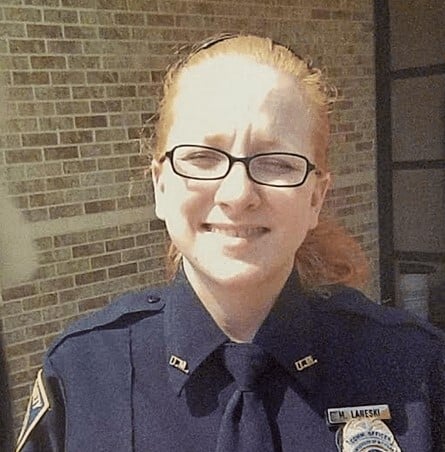
Created by: Maureen Laneski
Psychometric Tutor, Prepterminal Test Expert
130 students, 4.6, 28 Reviews
About the Author: Maureen Laneski’s Journey as a Dispatcher and 911 Dispatch Trainer
Maureen Laneski is an experienced public safety communications expert, dispatcher, and trainer with 18 years of dispatch experience and a master’s degree in teaching. She was her department’s first certified communications training officer and has trained numerous dispatchers over 10 years. Maureen started as a part-time dispatcher while pursuing her college education and competed against 800 other applicants for a full-time position, which she secured despite a lack of guidance and preparation. Maureen’s experience fueled her passion for assisting others in the dispatch field, and she now contributes to Prepterminal’s 911 Dispatcher Rapid Prep by creating comprehensive preparation materials for future dispatchers.
Any questions about the course? Contact Maureen at [email protected]
